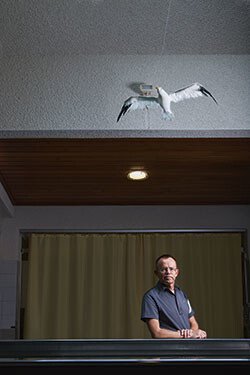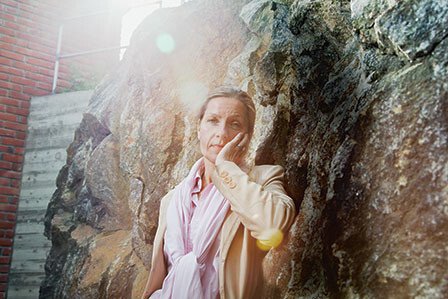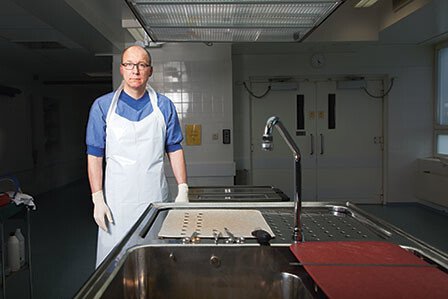A tale of three researchers: With death as a colleague
In our society we do our best to keep death at bay. Many adult humans have never seen a dead corpse, and do not wish to think about death unless it is absolutely necessary. But some think differently: We have talked to three researchers who have chosen to work full-time with death.
Peter Strang: "I have become less afraid of death"
Name: Peter Strang
Title: Professor of Palliative Medicine, especially Oncology, at the Department of Oncology-Pathology, Karolinska Institutet, consultant physician at Stockholms Sjukhem.
Research area: How to best ease and improve the trying final times of dying persons and their next of kin through reduced pain, nausea, anxiety and worry, and supportive discussions in cases of existential crisis.

"I started my research on terminally ill cancer patients in the 1980s and I saw that they were not getting the optimal level of support. I felt that I could make a real difference for them, but it was an uphill battle as the issues I brought up seem¬ed alien.
Today I think that we have become good at easing physical symptoms, but we are not always as good at tackling existential anxiety related to life and death issues. I try to develop this in my research.
The time just before a person passes away is almost always quiet and peaceful. But before that point, many who are near death naturally pass through stages of despondency. Death is a situation that we cannot escape, instead it forces us to choose a perspective. The extremes are allowing death to spread out and dominate all aspects of your life, or allowing the reality of death to become the source of an increased feeling of being alive.
Today, existential questions have become a natural part of the health services, and through discussions you can help a sick person to rediscover their sources of meaning - and the fact that you can live as long as you are alive.
By studying and meeting hundreds of dying people and their next of kin, my own fear of death has decreased significantly, while I still understand and respect people who feel anxiety in the face of the unknown. I have become more aware of the fact that death is a part of life, as a framework that defines that which is inside it - that is to say, life. It has helped me face the big questions in life, about what is important in my life and what is not, and I try to live my life more consciously now, when I am alive and healthy."
Text: Helena Mayer
Ulrika Kreicbergs: "Many advised against conducting the study"
Name: Ulrika Kreicbergs
Title: Researcher at the Department of Women's and Children's Health, Karolinska Institutet, registered nurse.
Research area: How the risk of mental ill health can be reduced among family members when a child dies of cancer.

"As a newly graduated nurse I started working at the children's oncology ward at the Karolinska University Hospital and witnessed how three young boys died in a short period of time, and how their parents handled this in different ways. It affected me deeply, and I eventually started to research how to best approach parents who lose a child, and what is important to them in our care for the child and the family.
Many of my colleagues advised against conducting the study, as they believed it would open old wounds and stir up feelings amongst the parents who had lost a child. But the parents wanted to talk about their experiences, and the study showed that almost all parents felt that the study was valuable, and not a single parent later regretted speaking to their child about death. The staff should therefore, before it is too late, encourage parents who are unsure about if they should talk to their children to do so especially if the child is aware of his or her imminent death.
During the study my children wondered why I did this work when all the stories made me cry. But with the support of family and colleagues I got through it, although I will always carry those stories with me. I do not even want to think about losing my own children, but seeing how parents manage and move on makes me less afraid.
Witnessing how children these young, brave people - have faced death, I too have become less afraid of death. I believe it is easier to learn from children than from adults. Children live until they die and often have a naive view of death, such as it leading to them Nangijala. We have much to thank Astrid Lindgren for.
Text: Helena Mayer
Henrik Druid: "I can help with the grieving process"
Name: Henrik Druid
Title: Professor of Forensic Medicine at the Department of Oncology-Pathology, Karolinska Institutet.
Research area: How the diagnostics concerning the cause of death when a person has died unexpectedly or in a manner that the police consider unnatural can be improved.

"The fact that I became a forensic pathologist, and later a researcher in forensic medicine, was due to a combination of chance and the fact that I wasn't happy with my work conditions in the health services. As a doctor I did not feel that I could give the time required to my patients, something which I can do as a forensic pathologist.
I have carried out around 6,000 autopsies, and in many of these cases I have been in contact with the next of kin. My research include studies aiming at developing better methods to determine the cause of death, something which can be hard when drugs are involved. This is information for which the next of kin tend to be thankful, and in this way I feel that I can help them in their grief.
We try to always make the body look as clean and intact as possible, and I usually recommend that the next of kin to see it. I think it helps people understand and accept what has happened.
Our view of the dead body is culturally conditioned. I personally saw a dead person for the first time when I was 17 years old. It was my grandmother and it looked peaceful, but also weird and I felt uneasy.
In India, where I worked for a while, people have a different attitude. When someone dies, close relatives will take care of the body and take it to the morgue and back when released. Death is there seen as a more natural part of life, and I think we can learn something from these cultures. There is nothing dangerous in seeing or touching a dead person."
Text: Ola Danielsson
First published in Medical Science 2012
